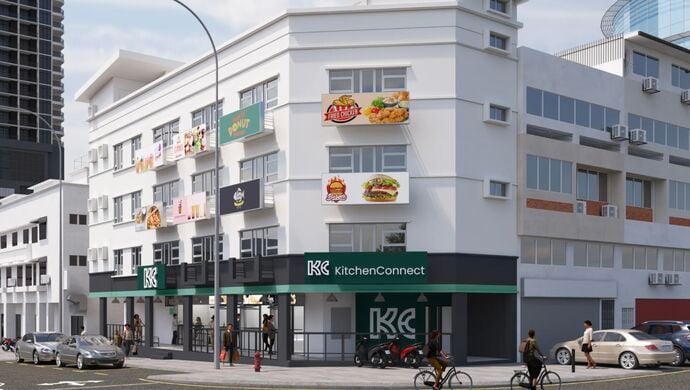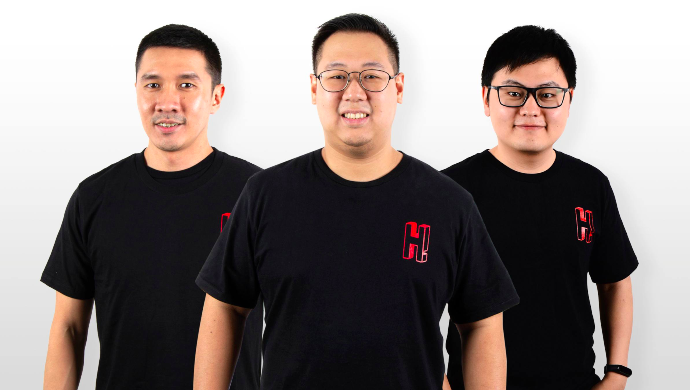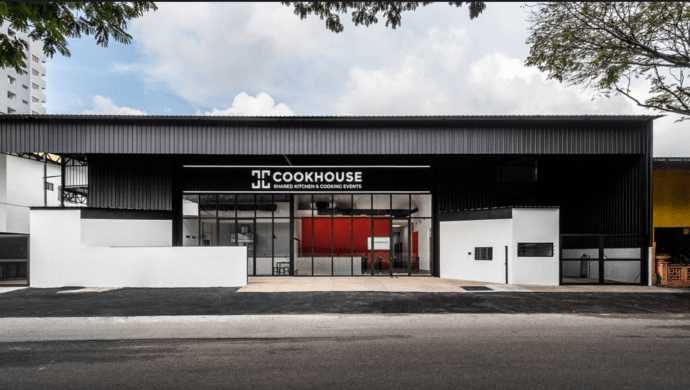
A KitchenConnect facility in Kuala Lumpur Malaysia
Cloud kitchens or ghost kitchens are the new growing trend in the foodtech sector. The vertical has witnessed a boom of late, thanks to the emergence of COVID-19. As the pandemic adversely affected the F&B industry and threw life out of gear, many traditional restaurants started relying on ghost kitchens to reduce overhead costs.
Ghost kitchens are commercial facilities purpose-built to produce food specifically for delivery. Also known as ‘shared kitchens’, ‘dark kitchens’ and ‘virtual kitchens’, they are centralised licensed commercial food production facilities where multiple restaurants rent space to prepare delivery-optimised menu items.
Generally, traditional restaurants handle various aspects of operations, including employees and rentals. In addition, they provide facilities for customers to dine in. Ghost kitchens save brick-and-mortar restaurants from all these hassles.
While the concept existed in one form or the other for a long, it has been gaining immense traction and popularity of late.
Below is a list of 27 ghost kitchens operating in various countries across Southeast Asia.
GrabKitchen
Owned and operated by on-demand services giant Grab, GrabKitchen brings together popular restaurants in one place. According to the firm, such centralised food preparation facilities enable merchants to meet the rising demand for food delivery services cost-effectively.
GrabKitchen enables consumers to combine their favourite menus from two or more restaurants in one order and delivery.
First introduced in Jakarta in 2018, GrabKitchen has rapidly expanded to 55 locations throughout the region. Its service is currently available in Singapore, Indonesia, Thailand, Vietnam, and the Philippines.
GoFood
A unit of Indonesian tech unicorn Gojek, GoFood was initially a food delivery app. Also known as Dapur Bersama GoFood, it aims to help culinary SMEs develop their business.
GoFood is an economical choice for brands to get closer to customers in new areas. It helps you minimise high costs for employee salaries, building rentals, cooking facilities, and the cost of finding the usual strategic location.
Everplate
Based in Jakarta, the startup partners with companies to help them create their brand. Partners can run their entire restaurant from a single tablet in Everplate’s ghost kitchen. Restaurants can also sync all the orders in one easy-to-see screen, manage multiple restaurants, and get all the data.
Also Read: How millennials and the pandemic are driving the growth of ghost kitchens in Indonesia
Everplate also provides tools and insights to help manage the business of F&B operators, predict demand, and increase the return.
Its services are available in seven locations in Jakarta.
Hangry
Hangry follows an asset-light business model wherein it produces “quality food at affordable prices” to cater to the urban, mobile-first consumers in the archipelago.

Hangry founders
Founded in 2019 by Abraham Viktor, Robin Tan and Andreas Resha, it has opened multiple brands with large culinary varieties, such as Moon Chicken (Korean-inspired fried chicken), San Gyu (authentic Japanese cuisine), and Ayam Koplo (a new take on traditional ayam geprek and various chicken delicacies).
As of today, Hangry runs more than 40 outlets in Greater Jakarta and Bandung. In 2020 alone, it opened more than 35 outlets and claims to have grown 22x over the year.
In May, Hangry announced oversubscribed funding of US$13 million in an Alpha JWC Ventures-led Series A round.
Yummy Corp
Launched in June 2019, Yummy Corp. operates the online catering brand Yummykitchen, which uses the latest technology to develop innovative solutions for corporates and F&B brands. The startup rents out shared kitchen space and carries out operational procedures on behalf of partner brands to help them accelerate their expansion and reach wider consumers.
To date, Yummy Corp claims to have served over five million meals and has over 70 kitchens serving more than 50 brand partners to manage their daily F&B operations.
In September last year, the Indonesian startup raised US$12 million in Series B funding, led by SoftBank Ventures Asia.
Dailybox
Dailybox was set up in 2018 as part of the Indonesian F&B company, The Daily Group, which also owns beverage brand Anytime and sushi label Shirato.
The startup collaborates with individual partners as well as cloud kitchen services such as GrabKitchen and Yummykitchen.
In H1 2021, the startup opened over a hundred outlets in Java, Bali, and North Sumatra. Dailybox claims it has the largest number of ghost kitchen outlets in Indonesia among F&B brands.
Amid the COVID-19 pandemic, Dailybox saw a surge in purchases, especially from its online delivery service, which contributed 80 per cent of total transactions.
In March, the company’s gross revenue increased 8x compared to the same period last year. The company is backed by Vertex Ventures.
Kita Kitchen
Kita Kitchen’s mission is to assist foodpreneurs focus on what really matters: food and branding.
A model established to seize the online delivery food market, Indonesia-based Kita Kitchen is a platform where restaurants can increase their delivery coverage. It innovates to provide advantages in the food delivery market at low capital expenditure, high expansion opportunities, and reduced overhead costs.
Telepot Co-Kitchen
Based out of Tangerang, Indonesia, Telepot Co-Kitchen is an online platform that offers cloud kitchen solutions to restaurant businesses. It provides a shared infrastructure facility to build the virtual restaurant through an integrated application, with services such as brand management, personal kitchen, and periodic cleaning operation.
Eatsii
The company offers both kitchen space and infrastructure to restaurants. In addition, it operates dedicated delivery and pick-up-only hubs. This way, it helps food businesses expand their delivery and takeout and enables restaurants to expand their operations conveniently and affordably.
The startup is based in Jakarta.
Kraver’s Canteen
Based in Metro Manila, the Philippines, Kraver’s Canteen provides online food ordering services. Its cloud kitchens cater to online orders and have no physical dine-in space, thereby enabling customers to get food faster and more efficiently. Currently, it supports brands such as Tiger Sugar, Yogost and Tonkatsu Maisen (Bench Group).
Launched in 2020 by Eric Dee, Victor Lim and Victor Mapua, Kraver’s Canteen in April secured US$1.5 million in a seed round led by Foxmont Capital, with participation from Lance Gokongwei (Chairman of JG Summit, Robinsons, Cebu Pacific), Brian Cu (co-founder of Grab PH, gojek, Zalora), and Paulo Campos III (co-founder of Zalora).
MadEats
MadEats was launched in November 2020 by an all-female founding team of Villareal, Andie Cruz (CMO), and Keisha Lao (CPO). It is an on-demand delivery-only restaurant group building its food concepts, besides taking orders from its virtual storefront and fulfilling deliveries with its fleet of riders.
Since its launch in November, MadEats has launched three brands — Yang Gang, a Korean fried chicken shop; Chow Time, a Chinese takeout; and Fried Nice. The company will soon launch its fourth concept focused on coffee.
Early last month, Manila-headquartered MadEats secured US$125,000 in funding from the Silicon Valley-based startup accelerator Y Combinator. It is the first cloud kitchen startup to be selected for the prestigious programme.
CloudEats
CloudEats, which was launched in June 2019, develops its ghost kitchens in non-retail and cost-efficient spaces, with operations and layouts specifically designed for food delivery. It currently has five ghost kitchens in the Philippines that house 70 in-house restaurant brands.
Unlike GrabKitchen, it does not lease kitchen spaces to third parties. Instead, the startup operates its own kitchens for its in-house restaurant brands.
In April 2020, the Filipino startup raised US$1.4 million in a seed funding round led by local family offices with large stakes in the real estate and food and beverage industries.
KitchenConnect
Headquartered in Kuala Lumpur, Malaysia, KitchenConnect provides professional kitchens designed to accommodate every chef or cuisine, to let them open up nearly any type of restaurant. Each space is outfitted with all the essentials.
It integrates services that complement the kitchen space, such as quick onboarding with local food delivery apps, marketing growth consultation, front-of-house operation management, insurance, and maintenance.
COOX
COOX is like a co-working space for food operators. It has several exclusive cooking suites (from 88-132 sq ft) in Kuala Lumpur’s flagship location. It offers delivery, takeaways, dine-in and even drive-through for patrons to get a taste of all their favourite food from one single spot.
Each F&B operator will only need minimal staff to do the cooking, and COOX will handle things on the front-end, such as delivery orders and license applications.
Co-founded by former Youth & Sports Minister Syed Saddiq Syed Abdul Rahman, COOX was conceptualised after restaurant and stall owners were forced to either close down for good or scale down their operations due to the pandemic.
CookHouse
CookHouse is a shared kitchen, cloud kitchen, co-working space, community club — all rolled into one. According to its founder Huen Su San, Cookhouse stands out from other ghost kitchens because it’s a community-centric ecosystem.

Besides the infrastructure and equipment, the Kuala Lumpur-based company has built a community and networks to support the food businesses. A member of the Cookhouse community benefits from these networks and working alongside a community made up of passionate food entrepreneurs from all walks of life.
Pop Meals
Pop Meals is a full-stack food delivery service based in Malaysia.
Launched initially as dahmakan by food delivery industry veterans, it claims to be the first Malaysian startup to participate in Y Combinator’s accelerator programme.
It operates on a full-stack platform, an operating system that allows us to control nearly every step of its operations — from recipe development to last-mile delivery.
Loop Foods
Loop Foods is a multi-brand cloud kitchen that leverages data and a tech-enabled network to serve great food through food delivery channels. Users can order from these three restaurants/brands via our Loop Foods website within a single delivery order.
It currently has Spargo Eats, a farm-to-fork healthy meal delivery service, as one of its brands operating since March 2021. Loop Foods is launching two brands. Busy Bee focuses on sourdough sandwiches and good coffee from its friends at Nespresso designed for busy bees (corporates). Plant Nation offers a plant-forward menu offering, which caters for plant-based diets, vegan and vegetarian customers.
Loop Foods was part of Sunway iLabs Super Accelerator Programme. It secured up to RM100,000 (US$24,000) funding from Sunway and a potential pilot project across 13 of its business divisions.
Smart City Kitchens
SmartCity’s state-of-the-art virtual kitchens in Singapore are optimised for food-delivery businesses intent on keeping costs low and profits high. Its kitchens boast anywhere from 20-32 units, some of which have dine-in availability.
It offers a low-risk, low upfront capital investment and high upside opportunity for small to medium-size F&B operators to launch and expand their restaurant or food delivery business.
Kitch
It is Les Amis Group’s first-ever cloud kitchen concept.
Based in Singapore, Kitch is a venture-backed marketplace that connects commercial kitchens with food business. It brings consumers a wide variety of cuisines for takeaway and islandwide delivery from Serangoon Gardens.
Tiffin Labs
Tiffin Labs, based in Singapore, creates and scales delivery-optimised digital restaurant brands crafted by its culinary team and proprietary food trend analytics engine.
Its digital restaurant brands are carefully prepared and cooked out of its own network of partnered leading restaurants.
TiffinLabs was founded by industry veterans with leadership experience at the world’s leading restaurant, hospitality, food delivery, technology and real estate companies.
JustKitchen
JustKitchen operates a network of delivery-only commercial kitchens in the city-state, using a ‘hub and spoke’ model and marketing a proprietary and partnered food brands portfolio. Orders are automatically routed to ‘spoke kitchen’ nearest to the customer.
JustKitchen combines underutilised real estate, algorithm-driven supply chain optimisation and last-mile food delivery apps to reach underserved markets. It gives customers quick access to the freshest delivery foods they want and wherever they want.
Deliveroo
Deliveroo’s Editions help restaurants set up kitchens in new areas within just eight to 12 weeks, without the upfront costs of a high-street premise. It provides restaurants with data insights to know which cuisines will be popular in specific local areas.
Whether it is a local restaurant looking to expand, street food entrepreneurs seeking new customers, or a restaurant launching a new menu, Editions are designed to support innovation. Editions identify the cuisines that people want but do not have access to locally and then invests in restaurants that excel in those foods to help them set up in those local areas.
Foodpanda
Foodpanda is a satellite kitchen that assembles an array of items from different restaurants under one roof. Patrons of the 30-seater dine-in space will have the option to choose from (deep breath) Ichiban Bento, Crystal Jade Kitchen, Crystal Jade La Mian Xiao Long Bao, Coca Cola, Nene Chicken, Saap Saap Thai, Kaffe & Toast, Ben & Jerry’s, and Wingzone.
The Social Kitchen
The Social Kitchen is a social enterprise with a mission to benefit the vulnerable community. It partners with community organisations to operate their kitchen and cafe to benefit the disadvantaged communities by creating employment optimally.
It converts under-utilised kitchens into ghost kitchens, operated by well-known F&B brands, serving quality mid-tier to high-end dining options, takeaways & deliveries.
Tastes.co
Based in Thailand, Tastes has gathered more than 15 restaurants of various styles in one place, including a la carte food, noodles, chicken rice, spaghetti, Mexican food, bubble tea and Taiwanese shaved ice. The company helps restaurant owners who want to expand their branches do it at lesser costs.
Tastes provides restaurant management systems and equipment and increases restaurants’ marketing opportunities through online content creation and ads on Tastes social media.
Chef Station
Chef Station is a delivery-only platform in Saigon, Vietnam, that lets diners order from over 30 dishes from different F&B brands in one transaction. It brings various offerings from five trusted restaurants famous in both Saigon and Hanoi.
Chef Station boasts a broad menu with over 60 items, including Vietnamese, Korean, and US-style food. The company claims that Chef Station has a significantly wider selection of dishes to choose from when compared with food aggregators such as Now.vn, Foody, or GrabFood.
Tasty Kitchen
Tasty Kitchen follows a “home restaurant” concept in Vietnam, bringing unique and new culinary styles to diners. It promises pure taste from natural and fresh ingredients selected according to high standards from leading prestigious farms in Vietnam.
—
Image Credit: KitchenConnect
The post Everything from soup to nuts: Meet the 27 ghost kitchen startups in Southeast Asia appeared first on e27.

